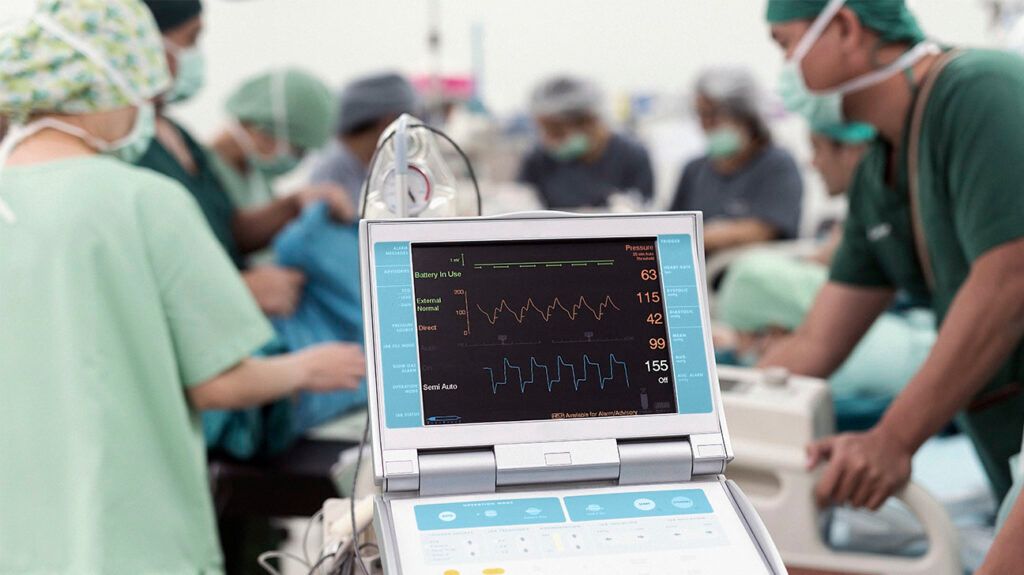Atrial fibrillation (AFib) is an irregular heart rhythm that can occur for the first time after heart bypass surgery. AFib will usually resolve by itself following surgery but may require treatment.
Heart bypass surgery, or coronary artery bypass grafting (CABG), is a surgical procedure to treat poor blood flow to the heart.
People may require CABG if they have narrowed or blocked arteries to the heart due to a condition, such as coronary heart disease. CABG may also be an emergency treatment for a severe heart attack.
AFib is an irregular heart rhythm, also known as an arrhythmia. With AFib, the heart’s upper and lower chambers do not coordinate as expected, causing an irregular heartbeat. This means the heart cannot pump blood properly, which can lead to complications.
For some, AFib may occur for the first time after having bypass surgery. This article looks at AFib after bypass surgery, including its likelihood, causes, symptoms, and treatment options.

According to a 2022 article, AFib is the most common complication of CABG, occurring 15–45% of the time following CABG.
A 2018 study examined the occurrence of AFib in 11,239 people undergoing CABG between 2002–2010. The occurrence of AFib following the procedure was 29.5%.
A 2021 systematic review found that in 155,575 people undergoing cardiac surgery, the occurrence of AFib following surgery was 23.7%.
According to the
If people do experience symptoms of AFib, they may notice the following:
- fatigue
- feeling dizzy or lightheaded
- fainting
- heart palpitations, such as feeling the heart skip a beat or an increased heartbeat
- low blood pressure
- breathing difficulties, particularly when lying down or exercising
- chest pain
People with heart disease may be more likely to experience symptoms of AFib.
According to a 2018 study, AFib usually begins 2–3 days after CABG. Episodes of AFib may typically last for several hours.
If people have no symptoms, doctors may identify AFib through physical examinations and tests,
- measuring the pulse to check the heartbeat
- listening to the heart’s rhythm
- using an electrocardiogram (ECG) to measure the electrical activity of the heart, which can show an irregular heartbeat
According to a 2022 article, major heart surgery, such as CABG, can result in inflammation, physical stress, and mechanical trauma, which may cause AFib post-surgery.
Risk factors for developing AFib after heart surgery may include:
- age
- being male
- a higher BMI
- obesity
- high blood pressure
According to a
- inflammation, likely due to direct manipulation of the heart during surgery and cardiopulmonary bypass, a technique doctors may use in heart surgery to temporarily replace the function of the heart
- structural changes to the heart
- changes in oxidative stress
- restricted blood flow to the heart after surgery
According to the
According to a 2021 study, it is most common for AFib to occur between 24–72 hours after CABG but may occur within 6 days following surgery.
The authors suggest AFib occurs most frequently on the second day after surgery. About 15–20% of the time, AFib will resolve by itself and return to a regular heartbeat within several hours.
Most times, post-surgery AFib returns to a typical heart rhythm within a few weeks following surgery.
Doctors may use medications to control the heart rate and prevent it from beating too fast. Rate control may include medications,
A 2022 review suggests doctors may use cardioversion to treat AFib if people have symptoms or if their condition is unstable.
Cardioversion is a treatment to return the heartbeat to a typical rhythm. It may take the form of medications or a procedure that delivers an electrical shock to the heart.
Following cardioversion, or if AFib continues for more than 48 hours and people have an increased risk of stroke, the review suggests doctors may give people blood thinners.
People may need to take blood thinners for at least 4 weeks. People with a high stroke risk may need to take them for longer.
Without treatment, AFib
If people experience AFib symptoms following bypass surgery, they should tell a doctor. AFib usually resolves by itself after heart surgery, but people may require treatment for AFib if there are symptoms, if AFib continues, or if they have risk factors for stroke.
People should call 911 or seek immediate medical attention if they have symptoms of any serious complications of AFib or treatments, such as blood thinners. These symptoms and complications may
- sudden weakness or difficulty walking
- difficulty speaking or slurred speech
- sudden headaches
- vision changes
- bright red blood in vomit, stools, or urine
- severe abdominal pain
- memory loss
- excessive bleeding
- chest pain, or pain in the jaw and shoulders
- nausea or vomiting
- shortness of breath
- feeling dizzy or lightheaded
- sudden fainting, which can be a sign of cardiac arrest
Atrial fibrillation can occur as a complication of bypass surgery. Heart surgery may cause inflammation or changes to the heart and surrounding tissues, which may result in AFib.
AFib is usually temporary after coronary artery bypass grafting (CABG) and may resolve by itself within a few hours. If AFib continues or people have symptoms, doctors may treat AFib with medications or electric shock treatment to restore a regular heart rhythm.
If people have an increased risk of stroke, a doctor may also prescribe blood thinners.
If people experience any symptoms of AFib following heart surgery, they can contact a doctor who will prescribe any necessary treatment.
